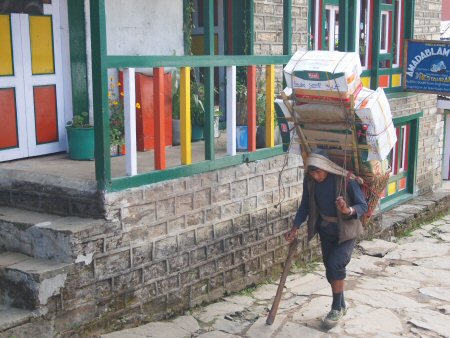Porters
The
trails were
filled with porters, carrying goods up and down.
We had our own porters, who
carried our food,
cooking gear, fuel, common area tents, our individual tents and
sleeping pads,
and our duffels.
But most of the traffic
on the trails besides trekkers were porters carrying goods for the
lodges up
and down the valley.
|
|
Porters
all carried
loads on their back, on slings suspended from their head.
I
hate to think what this must have been
doing to their neck vertebra.
But they
could hoist a truly remarkable amount of weight in this way. Most
porters carried bamboo baskets filled
with goods of one kind or another. The
basket itself was about 3 feet deep, but often it was filled way over
the top,
so that the stack of good was six feet high or more, far bigger than
the
typical porter.
|
Porter Carrying Beer
|
|
|
The
porters carrying
heavy loads all have a peculiar kind of walking stick: a stout stick
topped
with a T.
They use this to sit
down on
to rest.
The porters rest often:
from our
point of view they are either resting (as we pass) or hurrying past us
walking
unreasonably fast, often cutting the steep switchbacks and going
straight up
the steep slopes.
|
|
|
Resting on Sticks
|
|
|
There
are little
sitting spots -- little benches constructed along the trail -- where
the
porters rest.
We sat on these
ourselves
occasionally, but we usually tried to get up and let the porters sit
there if
they came by.
We also tried hard to
get out of the way as they barreled by, going up or down the trail. Because
of their heavy loads, the porters
were less able to maneuver than the trekkers.
|
Carrying Refrigerator
|
|
Some of
the more
impressive loads I saw were:
- Two
bags of rice, each
marked 20 Kilos, being carried by girls that looked no older than 10. I
presume these were being carried locally.
- A
refrigerator in a box.
At first, when I
saw the refrigerator box, I
thought it must be filled with something else, but no, it actually
contained a refrigerator.
I saw at least
three refrigerators going by during the time we were there.
- Stacks
of plywood: 4x8
sheets of plywood, thick stacks, that look like they must weigh 80-100
pounds, at least twice as large as the porters carring them.
- Beer
-- cases of
Everest Beer, filling the basket and stacked several feet above. I
can hardly guess how much this must weigh.
- Kerosene:
we saw lots
of this going up the hill, and lots of empty containers coming back
down.
| Although
we flew in
to Lukla, all our food and supplies and almost all our staff came in
overland.
This involves an 8 hour
bus
ride to Jiri and six days on the trail from there.
And
it is not a flat trail: there is one
14,000 foot pass on the way.
This means,
I guess, that is cheaper to carry something on a person's back for six
days
than to fly it one hour to Lukla. That's
the price of labor. |
|
|
Our Yaks and Gear
|
Previous Topic
Main
Trek Page
Next
Topic
 Go
back to Charles Hayden's Home Page
Go
back to Charles Hayden's Home Page
cchayden@gmail.com
